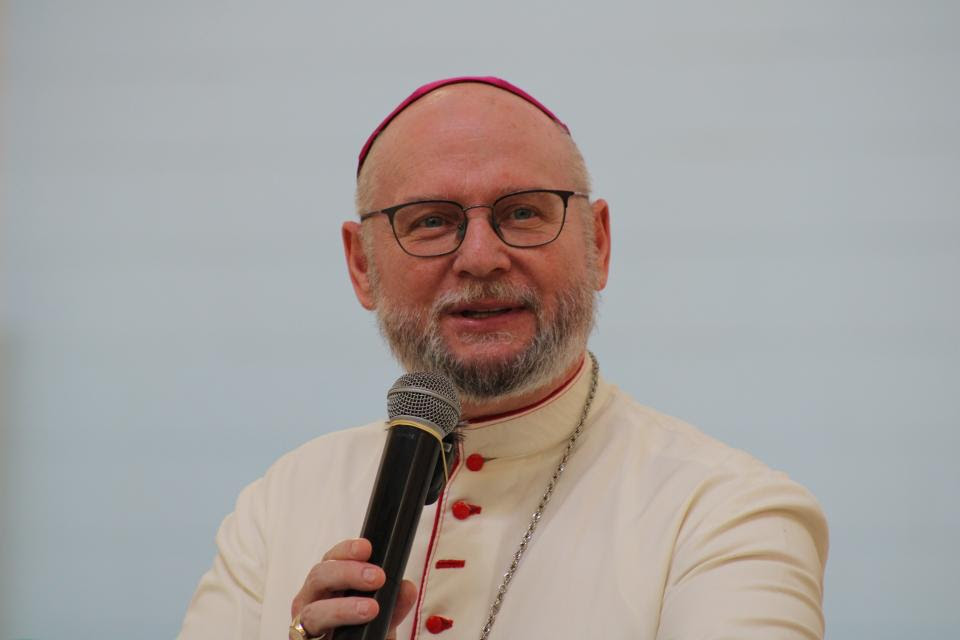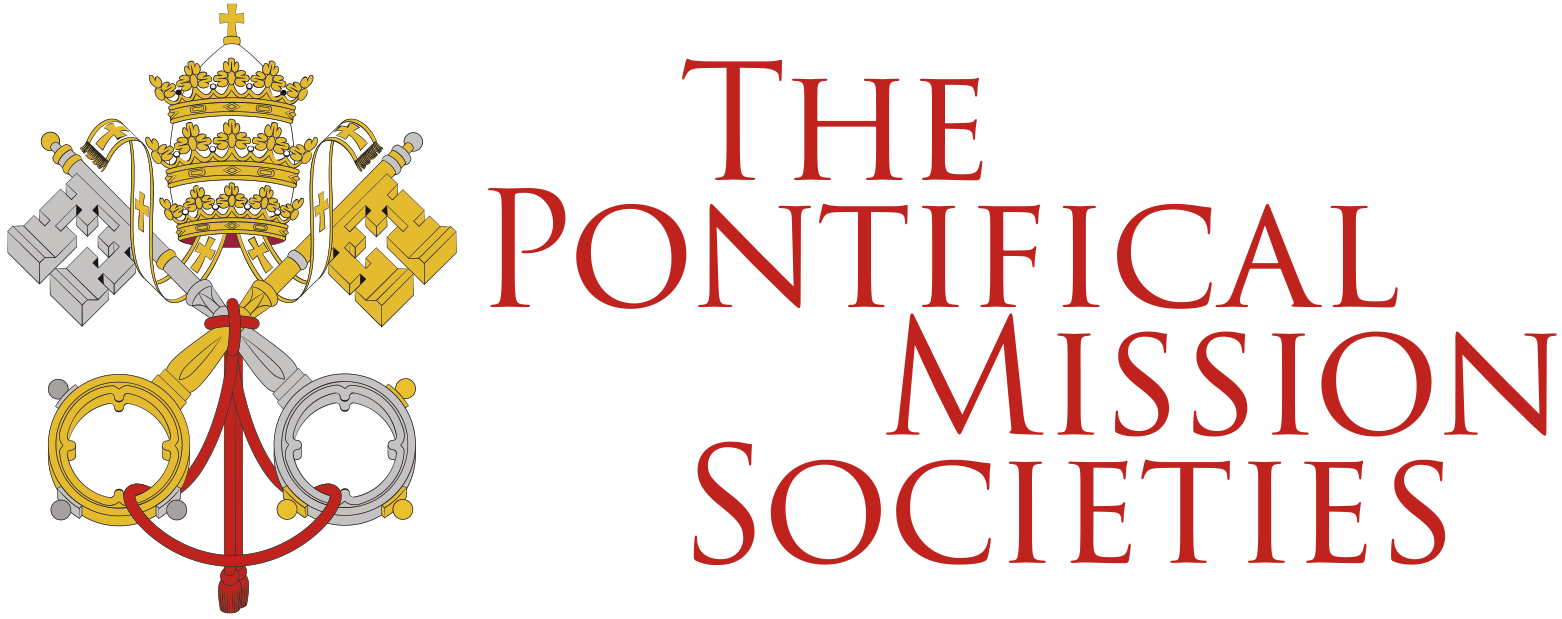
In these past months, we have shared with you stories of Missionaries, of children who take part in MCA activities, and of religious sisters who work with kids in the United States, helping them understand the importance of praying and doing little things for those who have yet to hear the Gospel- from giving up that second cookie to donating to help build churches there where there is none.
Today we introduce you to Archbishop Peter Wells, born a few moons ago in Tulsa, Oklahoma. He has worked in the Vatican’s Secretariat of State and several nunciatures, meaning embassies from the Holy See worldwide.
We asked him some questions in February when he was still the nuncio in South Africa, Namibia, Lesotho, Eswatini, and Botswana, but he has been transferred now.
Read all about the role of Archbishop Peter Wells and the incredibly important role nuncios play in making sure the Gospel reaches all over the world:
1. Can you briefly introduce yourself?
I was born and raised in Oklahoma, a mission area by the way. I was ordained a priest for the Diocese of Tulsa and have been a Vatican diplomat since 1999. I have been serving as the Apostolic Nuncio to Southern Africa for seven years now and have just been transferred to Thailand, Cambodia, and Laos.
2) In your role as Nuncio, can you explain to us how do The Pontifical Mission Societies work in countries such as South Africa, Namibia and Lesotho, Eswatini, Botswana?
The technical part, of course, is fairly straightforward: Dioceses and other eligible Church entities make their annual applications to the different agencies of The Pontifical Mission Societies requesting assistance for specific projects. These projects are then studied and approved by the Pontifical Representation and forwarded to The Pontifical Mission Societies’ offices in Rome for further study and consideration. In a more general way, I would say The Pontifical Mission Societies work very well here.
This is a developing area, and the assistance of The Pontifical Mission Societies makes the difference between a functioning, if not challenged, local Church and a seriously impeded Church. The people here are very committed to their communities, but many are poor. It is all they can do to keep their families fed. While they are generous in many ways, there is often insufficient income to keep the local Church going. The assistance of The Pontifical Mission Societies makes sure that the community here can continue to reach out to those in need, educate our young, catechize our faithful, and do many other things to encourage and develop the Body of Christ in Southern Africa.
3. How would you describe the impact of The Pontifical Mission Societies in Mission territories?
Enormous! One must only think of education, health care, social programs, formation of seminarians and lay Catholics, evangelization, construction of churches and other Church-related structures, promoting the human person, etc. Many of these activities are made possible because of the support of The Pontifical Mission Societies.
Without The Pontifical Mission Societies, the Catholic communities and the Church’s influence in these areas would be meager realities. People often mention that, especially in areas with very small Catholic populations, the Church seems “to punch above its weight.” Much of this is due to the generosity and assistance of The Pontifical Mission Societies. It is in part because of The Pontifical Mission Societies that the Catholic communities in these regions are often vibrant, effective, influential, and growing. TPMS has given these local Churches the ability to evangelize and care for others and work toward the eventual goal of self-sufficiency. People in positions such as mine are fortunate enough to witness this every day.
4. Some believe that missionaries are a thing of the past and that instead of going to far-flung places, they should stay at home, where priestly and religious vocations are also needed. What would you say to them?
As long as there is evangelization, there is a role for missionaries. We tend to think of missionaries as still coming from the West. Practically all of us had an Irish or Italian missionary priest or sister who ministered to us at one time or another. However, the truth is that missionaries have not come from the West for some time now. They are more likely to come from Africa or Asia. The areas that need missionaries are also changing. Often we see that it is the West that needs the missionaries. In fact, The Pontifical Mission Societies, for years now, have been supporting Churches which are the training grounds for future missionaries. All the more reason to support their work!
5. Can you share with us concrete examples of how the prayer and financial help of Catholics from the United States and beyond can impact the lives of Catholics- and those who have yet to hear about Christ – in the countries where you have served?
Prayers are so needed. It was very obvious to us in recent years that people were praying for us. This area is still very affected by HIV/AIDS. Funding from agencies such as TPMS helps us to address issues related to this pandemic, such as education and prevention ethically and holistically. As the whole world knows, Southern Africa had terrible challenges during the COVID-19 pandemic, and we are certain that those praying for us helped us make it through that most difficult period. The finical support of the TPMS was indispensable. If it were not for the TPMS, some dioceses would have failed economically. Also, the charity of so many made it possible for us to feed numerous families and especially children who are still at risk. When schools closed, many children who depended on school meals were left without food. The generous contribution of others allowed us to ensure they were fed. These are just a few examples. There are hundreds more examples I could give.
6. If you had to encourage a member of your family or your friends to support The Pontifical Mission Societies, what would you say to them?
Well, I am lucky. I come from a local Church constantly supported by the Home Missions. We grew up with missionary priests and Sisters and most of our Churches, schools, etc. were assisted by the Home Missions. We understand what it is to be a missionary Church and how the assistance we received helped our Catholic community become what it is today. We can never underestimate what a prayer or even a small offering can do. When you think that in some areas in this region, we can feed a child for 28 cents per meal, you can clearly see that even a small contribution can go a long way. The generosity of others has so blessed us. There is something very beautiful, very Catholic, about paying it forward.



